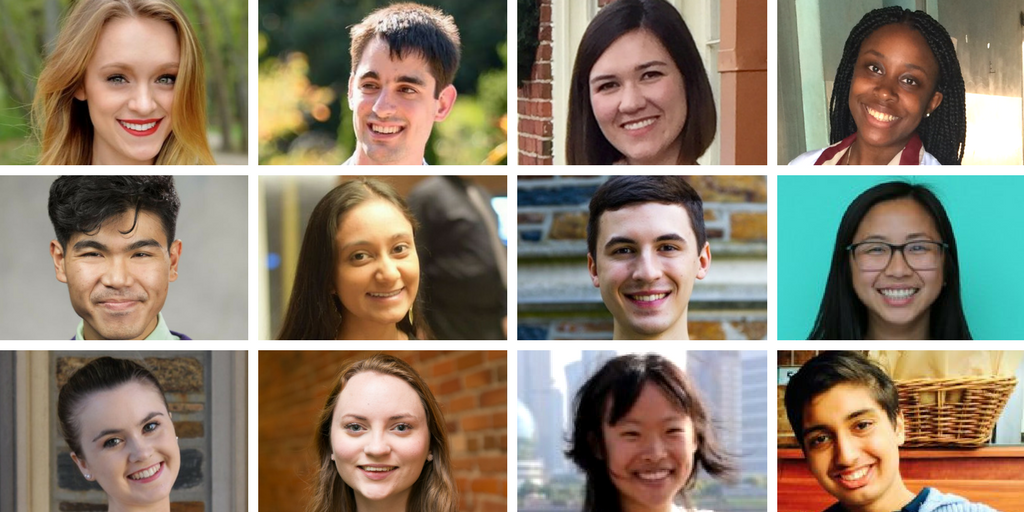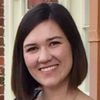Meet the 2018 Recipients of Bass Connections Follow-on Research Awards
April 3, 2018

Two Duke graduate students and ten undergraduates will pursue faculty-mentored research projects this summer and next year with grant funding from Bass Connections. These projects, which build on work begun on Bass Connections project teams, explore a diverse range of topics including higher education in Brazil, health literacy and infection care in Uganda, traditional healing in Nepal, the links between exercise and Alzheimer’s disease in women, community-based healthcare at Duke Health and vaccination rates among Honduran migrants.
Bass Connections Follow-on Student Research Awards provide support for students who wish to continue an aspect of their project team’s work. Funds may be used to support travel, equipment and other needs associated with the research proposal and can be used throughout the upcoming academic year.
Award recipients will be recognized at the Bass Connections Showcase on Wednesday, April 18 (3:30-6:00 p.m. in Penn Pavilion).
Lillian Blanchard, Sahil Sandhu, Jacqueline Xu


 Lillian Blanchard ’19 (Psychology), Sahil Sandhu ’20 (Program II: Health Innovation: Evidence to Impact) and Jacqueline Xu ’19 (Public Policy) plan to design and implement a “Help Desk” initiative in the Duke Health system, which will connect patients with community partner organizations that meet patients’ social and legal needs. This project continues the mission of the Global Alliance on Disability and Health Innovation (GANDHI) team, through which Blanchard, Sandhu and Xu have been researching the services and supports needed for patients to achieve their greatest quality of life during the transition from hospital to home. They will be mentored by Janet Bettger.
Lillian Blanchard ’19 (Psychology), Sahil Sandhu ’20 (Program II: Health Innovation: Evidence to Impact) and Jacqueline Xu ’19 (Public Policy) plan to design and implement a “Help Desk” initiative in the Duke Health system, which will connect patients with community partner organizations that meet patients’ social and legal needs. This project continues the mission of the Global Alliance on Disability and Health Innovation (GANDHI) team, through which Blanchard, Sandhu and Xu have been researching the services and supports needed for patients to achieve their greatest quality of life during the transition from hospital to home. They will be mentored by Janet Bettger.
Addressing the social determinants of health, such as food security, housing conditions, employment and education, is a critical step in reducing health disparities. Most health systems, however, lack infrastructure and incentives to manage patients’ social needs. To achieve health equity and reduce costs, we must make the crucial link between health care and community and social services through new, innovative health models. Our goal is to implement an Accountable Health Community model in the Duke Health system and create a Duke Help Desk, a community-based care model for social needs.
Linh Bui, Rob Steilberg, Kate Watkins


 As members of the mHealth for Better Routine Immunization Data in Honduras team, Linh Bui ’20 (Biology and Global Health), Rob Steilberg ’18 (Computer Science) and Kate Watkins ’19 (Biology and History) have been working to develop and implement a mobile health (mHealth) application for capturing and managing vaccination data for vaccinators in Roatán, Honduras. Their follow-on project is designed to assess and strengthen social support networks among migrant communities in Roatán in order to help families access vaccination clinics and thereby improve child vaccination rates. They will be mentored by Lavanya Vasudevan.
As members of the mHealth for Better Routine Immunization Data in Honduras team, Linh Bui ’20 (Biology and Global Health), Rob Steilberg ’18 (Computer Science) and Kate Watkins ’19 (Biology and History) have been working to develop and implement a mobile health (mHealth) application for capturing and managing vaccination data for vaccinators in Roatán, Honduras. Their follow-on project is designed to assess and strengthen social support networks among migrant communities in Roatán in order to help families access vaccination clinics and thereby improve child vaccination rates. They will be mentored by Lavanya Vasudevan.
Insecurity, extortion, intimidation and killings have forced many Hondurans to migrate from the mainland to the Honduran island of Roatán. This large population of Hispanic migrants have settled in a community known as La Colonia hoping to rebuild their lives and regain security. However, there is a discrepancy in healthcare, especially in child vaccination rates, between migrant Hondurans and islanders. We want to investigate whether this is due to a lack of social support networks in the community and plan to collect more data to discern whether these networks need strengthening. Through this, we hope to develop a solution to help migrant mainlanders get better access to vaccination clinics thus providing timely vaccinations for children.
Caitlin Grant and Shayal Vashisth

 Two undergraduate members of the Exercise as Therapy for Cognitive Aging and Alzheimer’s Disease team will take their research further by using a mouse model to study the sex-specific relationships among Alzheimer’s disease, aging and exercise. Neuroscience majors Caitlin Grant ’19 and Shayal Vashisth ’19 plan to use their follow-on research to lay the foundation for two inter-related senior thesis projects. They will be mentored by Christina Williams and Elizabeth Finch.
Two undergraduate members of the Exercise as Therapy for Cognitive Aging and Alzheimer’s Disease team will take their research further by using a mouse model to study the sex-specific relationships among Alzheimer’s disease, aging and exercise. Neuroscience majors Caitlin Grant ’19 and Shayal Vashisth ’19 plan to use their follow-on research to lay the foundation for two inter-related senior thesis projects. They will be mentored by Christina Williams and Elizabeth Finch.
One aspect of Alzheimer’s disease (AD) that most people do not realize is that more than two thirds of the people affected by the disease are women. While we do not yet fully understand the basis of this sex difference in AD risk, it is becoming evident that lifestyle factors – in addition to genetics and biology – play a critical role in determining risk. In particular, maintaining an active lifestyle and getting regular physical exercise appear to be able to influence the progression of AD and age-related cognitive decline. The goal of our project is to use a mouse model to further understand why females have a greater risk for AD and explore the possibility that exercise during the menopause transition might be able to decrease this higher risk in females.
Travis Knoll
 A doctoral student in history, Travis Knoll is the project manager of the Cost of Opportunity? Higher Education in the Baixada Fluminense team, which is investigating social mobility and access to higher education in Brazil. His follow-on project aims to trace the legislative, executive and judicial trajectory of affirmative action in Brazil as well as the links between racial justice policy and religious civil society organizations. Knoll is also a member of the Bass Connections Student Advisory Council. He will be mentored by his dissertation supervisor, John French.
A doctoral student in history, Travis Knoll is the project manager of the Cost of Opportunity? Higher Education in the Baixada Fluminense team, which is investigating social mobility and access to higher education in Brazil. His follow-on project aims to trace the legislative, executive and judicial trajectory of affirmative action in Brazil as well as the links between racial justice policy and religious civil society organizations. Knoll is also a member of the Bass Connections Student Advisory Council. He will be mentored by his dissertation supervisor, John French.
Covering the local, state and national levels, my dissertation highlights the role played by a group of Black Catholic priests and lay people in Rio’s poor urban periphery – known as the Baixada Fluminense – whose religiously informed activism contributed decisively to the passage, in Rio de Janeiro, of the first law that mandated racial quotas in the state’s public universities. My follow-on funds will allow me to study the Baixada in state archives, develop strategic partnerships and interview key church activists and officials at the local and national level.
Chinemerem Nwosu
 Chinemerem Nwosu ’19 (Program II: Determinants of Health Outcomes in Africa) is a member of the Interventions Improving Neurosurgery Patient Outcomes in Uganda team, which is working with Duke Global Neurosurgery and Neuroscience and Mulago National Referral Hospital in Kampala, Uganda, to develop interventions to improve neurosurgical patient outcomes. Her follow-on project will include a study designed to evaluate the impact of family caregiver health literacy on patient outcomes. Her faculty mentor is Michael Haglund.
Chinemerem Nwosu ’19 (Program II: Determinants of Health Outcomes in Africa) is a member of the Interventions Improving Neurosurgery Patient Outcomes in Uganda team, which is working with Duke Global Neurosurgery and Neuroscience and Mulago National Referral Hospital in Kampala, Uganda, to develop interventions to improve neurosurgical patient outcomes. Her follow-on project will include a study designed to evaluate the impact of family caregiver health literacy on patient outcomes. Her faculty mentor is Michael Haglund.
I developed a deep passion for improving health outcomes and health systems in Sub-Saharan Africa after my experiences growing up in Lagos forced me to think critically about determinants of health and their relationships to quality of life. This study will strongly aid my team’s project, which seeks to design and measure the impact of educational interventions to improve health outcomes. The findings will provide insight to determine the most cost-efficient and culturally-appropriate ways to address health education needs and develop educational materials that can potentially be adopted in low-income country healthcare settings.
Tony Pham
 Tony Pham, MD, is a psychiatry and global health resident currently completing a Master of Science in Global Health at Duke. A member of the Global Mental Health Program, a Bass Connections team working to advance integrated, context-specific approaches to mental health, he will explore the intersection of traditional healing and mental well-being in rural Nepal. His faculty mentor is Brandon Kohrt.
Tony Pham, MD, is a psychiatry and global health resident currently completing a Master of Science in Global Health at Duke. A member of the Global Mental Health Program, a Bass Connections team working to advance integrated, context-specific approaches to mental health, he will explore the intersection of traditional healing and mental well-being in rural Nepal. His faculty mentor is Brandon Kohrt.
Despite its global and cultural significance, research into the relationship between ethnospychology and mental illness is quite scarce. This study will explore the intersection of traditional healing and mental well-being in Nepal, a country known for its traditional healers, in order to form a more culturally informed perspective on reducing mental health disparities.
Samantha Sadler
 Samantha Sadler ’19 (Neuroscience and Global Health) is a member of the Interventions Improving Neurosurgery Patient Outcomes in Uganda team, which is working with Duke Global Neurosurgery and Neuroscience (DGNN) and Mulago National Referral Hospital (MNRH) in Kampala, Uganda, to develop interventions to improve neurosurgical patient outcomes. She will pursue the construction of an infection care protocol for the neurosurgical ward at MNRH that is designed to reduce the impact of limited resources on effective infection care techniques. Her faculty mentor is Michael Haglund.
Samantha Sadler ’19 (Neuroscience and Global Health) is a member of the Interventions Improving Neurosurgery Patient Outcomes in Uganda team, which is working with Duke Global Neurosurgery and Neuroscience (DGNN) and Mulago National Referral Hospital (MNRH) in Kampala, Uganda, to develop interventions to improve neurosurgical patient outcomes. She will pursue the construction of an infection care protocol for the neurosurgical ward at MNRH that is designed to reduce the impact of limited resources on effective infection care techniques. Her faculty mentor is Michael Haglund.
This project has been a personal goal of mine since I started working with DGNN. Generating an infection care protocol for the MNRH through extensive, bidirectional communication takes a major systematic step toward securing a sustainable future of improved patient outcomes. I hope this is the first part of a much longer process that can lead to the formulation of a broadly-applicable template for an infection care protocol that easily enables context-specific alterations and includes components unique to cultural norms and expectations.
Learn More
- Read about last year’s Follow-on Student Research Award winners.
- Join us at the Bass Connections Showcase on April 18.
- Explore stories from students on their Bass Connections experience.
